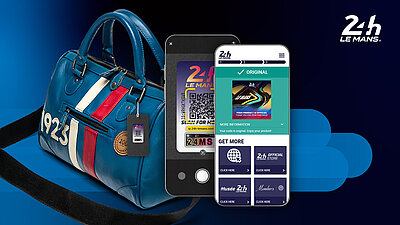The Problem with Counterfeit Lubricants and What Brands Can Do About It
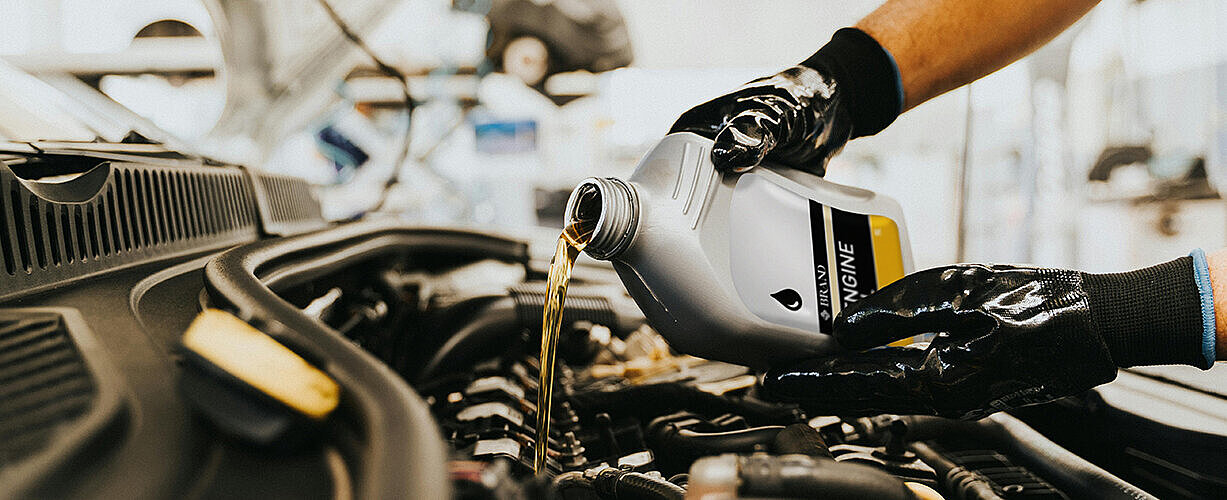
The world consumes approximately 35 million metric tons of lubricants every year. These essential fluids reduce friction, cool moving parts, and prevent wear across countless machines, vehicles, and industrial systems. While lubricants are also used in some biomedical contexts, their primary role remains in mechanical operations, especially in passenger cars, which account for the largest volume.
Key product categories include:
- Passenger car engine oil
- Heavy-duty engine oil
- Hydraulic fluids
- Brake fluids
- Transmission fluids
- Metal working and process oils
The Asia-Pacific region is the world’s largest consumer, accounting for around 44% of global lubricant demand, driven by strong manufacturing output and major automotive markets. Meanwhile, China leads the global petrochemicals market with a 43% share, followed by the U.S., Germany, and Japan.
The lubricant market is projected to reach over 200 billion USD by 2030. As global demand grows, so do the opportunities for counterfeiters. In high-demand markets, fake lubricants increasingly resemble original products in appearance but contain low-grade or even used oil. The result is dangerous for customers and damaging for brands.
The problem with counterfeit lubricants
Industry experts estimate that more than 20% of lubricants sold worldwide are counterfeit. These fakes are often visually identical to genuine products, right down to the packaging and branding. But what’s inside tells another story: Unregulated base oils, missing additives, or even used and recycled fluids.
The consequences are serious and far-reaching:
Engine and component failure: Fake lubricants often lack essential additives and can cause increased friction, leading to overheating, severe mechanical damage and life-threatening situations.
Excessive wear and tear: Poor-quality oils accelerate premature wear of metal components, which can result in equipment breakdowns and long-term reliability issues.
Loss of cooling properties: Counterfeit lubricants are often unable to regulate operating temperatures, leading to overheating, oxidation, nitration, and potential failure of internal components or entire systems.
Corrosion and rust formation: Substandard products fail to protect against moisture and contaminants, allowing rust to damage critical parts and infrastructure.
Contamination risks: Fake lubricants may contain impurities and debris that compromise performance and shorten the overall service life of equipment, as counterfeiters often use old, already used oil, also for refilling original bottles.
Higher maintenance costs: Frequent oil drains, unexpected breakdowns, and repeated repairs lead to increased operational expenses and production losses.
Unscheduled downtime: Machines running on poor-quality lubricants are prone to frequent failures, resulting in costly delays and a negative impact on profitability.
Sludge buildup and deposits: Fake lubricants often cause internal darkening, residue, and sludge formation, which degrade engine efficiency.
Increased emissions: Poor combustion efficiency due to substandard lubricants can lead to higher emissions and contribute to environmental pollution.
Because it’s so difficult to distinguish fake from real, even for professionals, counterfeiters exploit supply chain gaps and online marketplaces, especially in regions with limited regulatory oversight.
How counterfeits enter the market
Lubricants are particularly vulnerable to counterfeiting because they are often distributed in refillable containers and sold through fragmented supply chains. There are three main types of counterfeit activity:
- Refilling
Used bottles are collected, refilled with low-quality oil, and resealed with counterfeit caps. These are very difficult for non-experts to detect. A common practice is that garages, where many bottles accumulate during oil changes, store empty containers which are later bought and collected by counterfeiters.
To combat this, brands can integrate tamper-proof features or use smart code-based systems that link the code on the cap with the code on the bottle. During production, both codes are scanned at the same time so that they can be matched and uploaded into the digital database. When a customer later scans the bottle, the system verifies whether the cap and bottle codes still match, which makes refilling extremely difficult for counterfeiters to replicate accurately. For additional features such as loyalty programs, a second hidden code can be placed inside the cap that is accessible only to consumers.
- Copying
Some counterfeiters replicate the original packaging entirely, printing labels and sourcing bottles and caps that mimic the original design. The result is a nearly indistinguishable fake.
- Brand theft
This involves inventing a fake product using real brand elements such as logos, colors, and product descriptions. In markets with many local product variations, such fakes often go undetected.
How to spot counterfeit lubricants
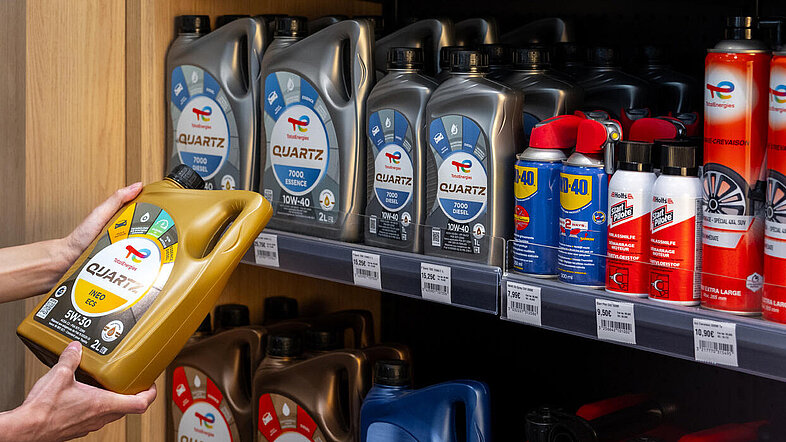
While counterfeiters often focus on appearance, they neglect the performance and consistency of the product. The following indicators can help identify potential counterfeits:
- Packaging quality
Genuine packaging is clean, precise, and consistent. If the label is crooked, the bottle feels flimsy, or the security seal looks tampered with, proceed with caution.
- Label errors
Look for typos, unusual logos, or missing regulatory information. Inconsistencies in language, branding, or print quality can be red flags.
- Product codes
Check if the product code or batch number matches the brand’s official database. Many authentic products now include QR codes for instant authentication.
- Oil appearance and smell
High-quality lubricants are usually light-colored and clear. Counterfeit versions may appear darker or smell burnt due to low-quality base oils.
- Viscosity and performance
If the oil feels unusually thick or sticky, or if your vehicle behaves differently after an oil change, it could be a counterfeit.
- Suspicious pricing
If the price is far below market value, especially on unfamiliar websites or third-party sellers, it may be a fake.
Customers should always purchase lubricants from verified sellers and authorized dealers. When in doubt, scan the product using the brand’s authentication tools or contact customer service.
Multi-layered Action Against Counterfeiting
Experts at the Major Energies Marketers Association of Nigeria (MEMAN) recommend a multi-layered action against counterfeit lubricants:
- Enforcement by regulatory bodies
- Stronger punishments for counterfeiters
- Education and awareness for consumers and mechanics
- Technological tools like tamper-evident packaging and digital verification
The KURZ SCRIBOS portfolio for lubricant protection
The lubricant market faces unique risks such as counterfeit products, refilled bottles, misleading packaging, and complex global supply chains. Our portfolio of modular and scalable anti-counterfeiting solutions is designed to address these challenges and protect brands, customers, and equipment.
ValiGate® Direct Print is a powerful solution designed for high-volume lubricant products where efficiency and security are equally important. By integrating the security feature directly into the product label during production, it removes the need for additional materials and fits seamlessly into existing print shop workflows, making implementation fast and cost-effective. Each label carries a unique encrypted QR code combined with a patented security pattern, enabling instant and reliable product authentication via smartphone without requiring an app. This approach not only scales effortlessly for millions of products but also reduces material usage, making it a sustainable choice for brands that need both speed and protection in competitive markets.
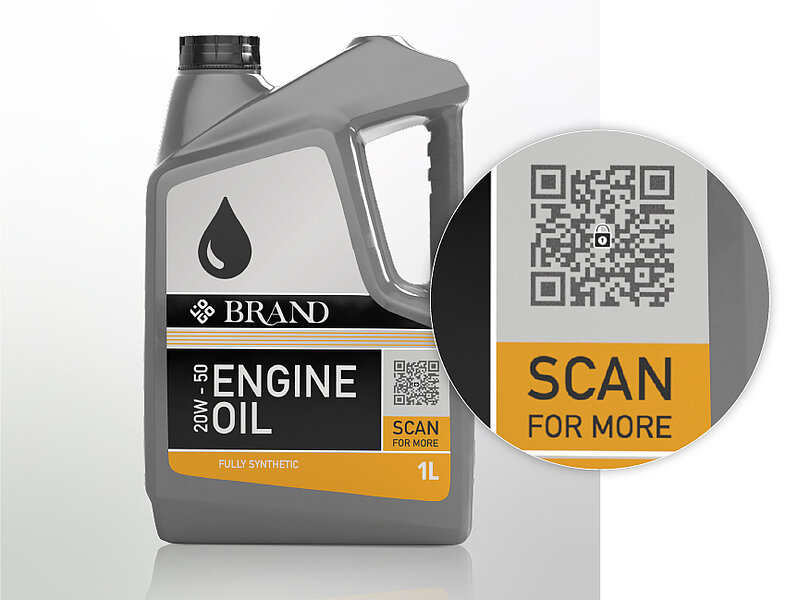
Security labels like VeoMark® or PrioSpot®
Our secure labels combine overt, semi-overt, and covert security features in one compact solution, making counterfeiting significantly harder. Designed to fit a variety of packaging formats, from small bottles to large drums, they provide visible proof of authenticity for consumers while giving inspectors and partners access to hidden verification features for added control. This dual-layered security is particularly valuable in the lubricant sector, where packaging is often reused or refilled.
Tamper-evident seals
One of the biggest threats in the lubricant market is illegal refilling, where used packaging is filled with fake or diluted products. Our tamper-evident seals solve this by making any attempt to open or reuse a package immediately visible. Once the seal is broken, it cannot be restored, giving customers peace of mind and ensuring products reach the market in their original quality.
In cases where seals are not visually desirable or space on the packaging is limited, we also offer alternative digital anti-refilling solutions. By assigning a unique code on the cap that matches a code on the bottle, brands can provide instant anti-refilling protection through scanning and comparing the codes on bottle and cap. If the codes do not match, customers immediately know that the product may have been refilled.
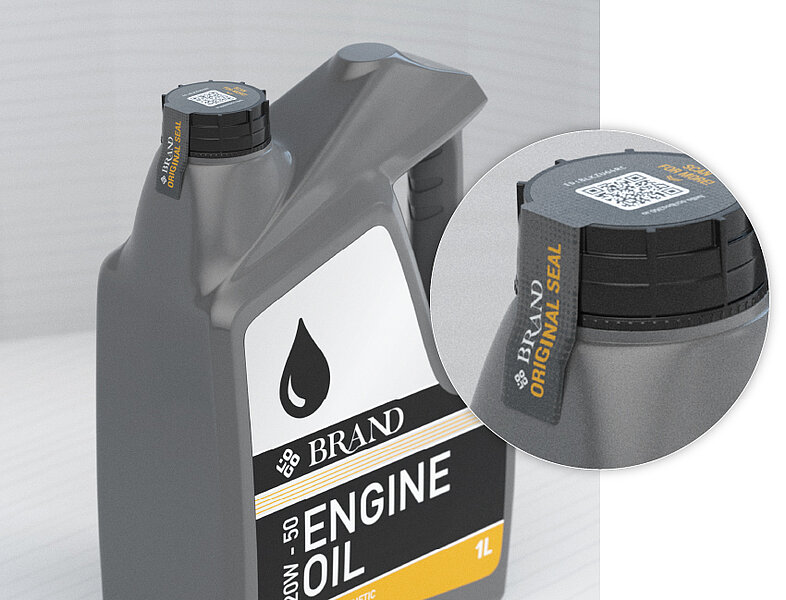
Visually striking holographic elements combine strong brand presence with advanced authentication capabilities. These eye-catching designs instantly catch consumer attention while integrating highly secure, hard-to-replicate features. Holograms can also be connected to digital verification through our platform, enabling brands to merge visual impact with data-driven protection.
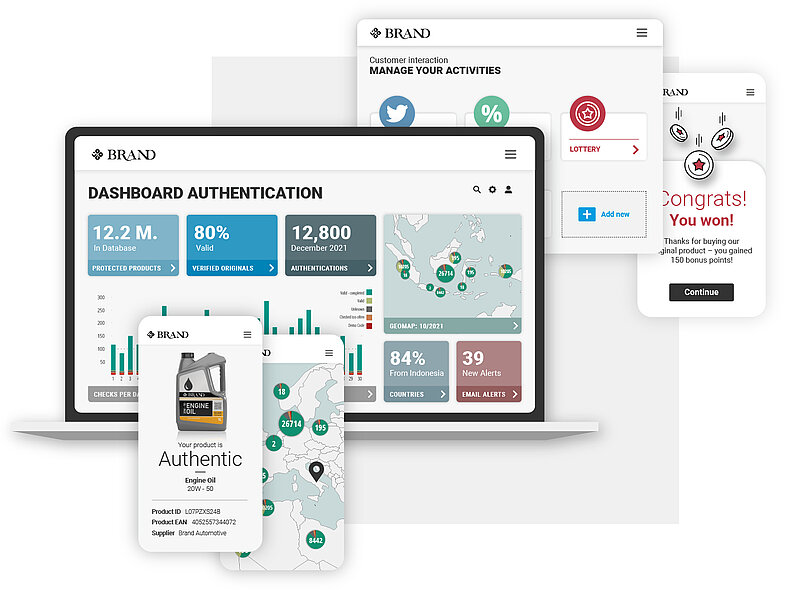
SCRIBOS 360 connects all security solutions and turns every scan into actionable insights. Consumers, partners, and inspectors can instantly authenticate products via smartphone, while brands gain real-time visibility into suspicious activity, product flows, and gray-market patterns. The platform also enables customer interaction and provides comprehensive data analytics to support strategic decisions and enhance brand protection.
Key modules include:
- Authentication enables instant product verification via smartphone, tracks counterfeiting trends and highlights problem areas
- Customer Interaction delivers trusted information and tailored digital experiences after each scan
- B2B Ordering manages security label orders efficiently across global supply chains
Real-world impact: Beyond detecting counterfeits, SCRIBOS 360 has proven highly effective at uncovering hidden fraud patterns. In one major client case, the platform revealed that what was initially assumed to be a local refilling problem was, in fact, a much larger and more sophisticated scheme. Counterfeiters infiltrated the original distribution network and managed to replace around 15 percent of genuine products with fakes during transport, likely by bribing truck drivers. These fakes were then sold by official dealers, unknowingly passing counterfeits to customers. Investigations at dealerships showed nothing because the fraudulent stock had already been sold, when it appeared as fake scans in the back-end. Such deep insights are only possible with SCRIBOS 360, enabling brands to uncover complex supply chain vulnerabilities and take targeted action.
The TotalEnergies Lubrifiants case
TotalEnergies Lubrifiants, a global leader in high-performance lubricants, faced growing challenges with counterfeit products that threaten engines, compromise safety, and damage brand trust. Their existing protection measures were no longer sufficient, so the company partnered with the KURZ SCRIBOS brand to implement ValiGate® Direct Print, a printed security solution combined with a customized digital platform.
The ValiGate® Direct Print feature is applied directly onto lubricant labels at more than 50 certified print shops worldwide. This allows seamless integration into existing packaging processes without adding extra labeling steps, making it highly efficient for a large and diverse portfolio. Each label carries an encrypted QR code within a secure pattern that customers can scan instantly with their smartphone — no app required.
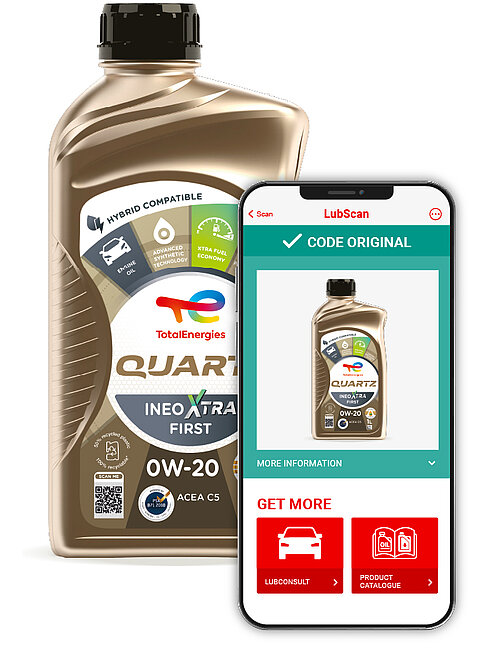
The printed security features are connected to Lub360, a customized version of our SCRIBOS 360 digital platform, combining two powerful modules:
- Authentication for real-time product verification, tracking scan activity and detecting counterfeit patterns
- Customer Interaction offering localized catalogs and access to LubConsult, a tool that helps users find the right lubricant
With this combination, TotalEnergies achieves consistent global brand protection, gains visibility into market activity, and offers customers an intuitive way to verify authenticity while accessing tailored digital services.
In short: How KURZ SCRIBOS protects lubricant brands
Our solutions help lubricant manufacturers secure their products, supply chains, and customer trust by:
- Preventing refilling and counterfeiting directly at the source
- Linking every product to a unique digital copy-proof identity
- Allowing customers to verify authenticity instantly without the download of an app
- Providing brands with real-time data and market insights
- Enabling control over global distribution through secure ordering
- Offering digital tools and services to strengthen customer loyalty
- Detect garages and shops that sell counterfeit products
Conclusion
Counterfeit lubricants continue to threaten engines, endanger lives, reduce brand trust, and damage the environment. Poor-quality oils not only damage equipment and reduce performance but also lead to increased emissions, contributing to poor air quality and environmental pollution. Choosing high-quality lubricants and taking action against counterfeiting is therefore essential for protecting both consumers and the planet.
The KURZ SCRIBOS brand is committed to supporting lubricant manufacturers with innovative solutions that secure products, protect supply chains, and build customer confidence. By combining advanced physical security features with powerful digital tools, KURZ SCRIBOS solutions help brands ensure authenticity, gain valuable market insights, and fight counterfeit products effectively.
Remember that oil is not just oil. The quality of the lubricant determines the performance and reliability of machinery. By choosing quality and leveraging KURZ SCRIBOS solutions, brands can safeguard their products, strengthen customer trust, and contribute to cleaner and safer markets worldwide.



